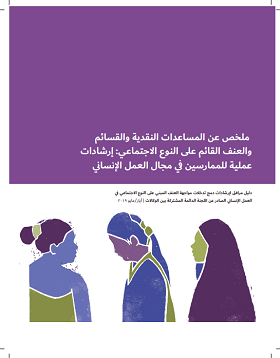النوع الاجتماعي والشمول
يمثل النوع الاجتماعي والعمر والقدرات وغيرها من السمات الفردية أو المتعلقة بالسياق فرصًا وتحديات مختلفة لتقديم المساعدات النقدية والقسائم للأشخاص الذين يعانون من الأزمات بطريقة كريمة.
بين الجهات الفاعلة الإنسانية، هناك اعتراف متزايد بالاحتياجات والقيود المحددة للأشخاص ذوي القدرات المختلفة، وكبار السن، الأشخاص من مختلف الأجناس، وخاصة النساء، والأشخاص المتنقلين. وإلى جانب ذلك، هناك تقدير متزايد للحاجة إلى تدابير مصممة خصيصًا وحساسة تضمن إدماجهم بشكل فعال.
إن دعم احتياجات الأشخاص المتنوعين من خلال المساعدات النقدية والقسائم يتجاوز مجرد جعلهم مجموعة مستهدفة؛ بل يتعلق الأمر بالمشاركة الهادفة، والتصميم والتنفيذ الهادفين، وتعديل البرامج لتلبية احتياجات المجموعات المختلفة بكرامة. وتسير نهج شامل جنبا إلى جنب مع المساعدات التي تركز على الناس.
الأولويات الحالية
ستواصل شبكة CALP تشجيع الجهات الفاعلة في مجال المساعدات النقدية على توسيع نطاق تركيزها لتكون أكثر شمولاً وتدعم فهمًا أعمق لكيفية تجاوز المساعدات النقدية والقسائم إلى ما هو أبعد من فكرة “عدم إلحاق الضرر” نحو تلبية احتياجات مختلف الأشخاص بشكل مناسب وبطرق آمنة وكريمة.
سنعمل على رفع مستوى الخبرات والمبادرات المتعلقة بالمساعدات النقدية والقسائم والنوع الاجتماعي، والمساعدة النقدية الشاملة للأشخاص ذوي الإعاقة، والعمل مع مختلف الأعراق والهويات الثقافية، ومجموعات الأقليات، والأشخاص ذوي الهويات الجنسية المتنوعة، والفئات العمرية.
ستسعى CALP أيضًا إلى جعل عملها متاحًا قدر الإمكان.
محتوى متميز

فيديو التعلم المصغر: المساعدات النقدية والقسائم والنوع الاجتماعي
Blog Post
يُقدم هذا الفيديو نظرة عامة على العلاقة بين النوع الاجتماعي والمساعدات النقدية والقسائم (CVA) التي تتمحور حول دورة المشروع الإنساني، والتي تشمل: التقييم وتحليل الاستجابة: كيفية تعديل عمليات التقييم لتحقيق انعكاس أكثر...

نتائج جندرية أفضل في المساعدة الغذائية من خلال البرمجة التكميلية ومتعددة الوسائط
إرشادات وأدوات
اقُتبست ورقة النصائح هذه من تقرير البحث، «نتائج جندرية أفضل في المساعدة الغذائية من خلال البرمجة التكميلية ومتعددة الوسائط .»
سعت الدراسة إلى الإجابة عن »كيف يمكن لعمليات التصميم 1 والتنفيذ والمراقبة للمشاريع التي...

ملخص المساعدات النقدية والقسائم والعنف القائم على النوع الاجتماعي: إرشادات عملية للممارسين في مجال العمل الإنساني
إرشادات وأدوات
الغرض من ملخص المساعدات النقدية والقسائم (CVA) والعنف القائم على النوع الاجتماعي (GBV) هذا هو مساعدة الجهات الفاعلة في مجال العمل الإنساني والمجتمعات المتأثرة من الأزمات والنزاعات على: إدماج الحد من مخاطر العنف القائم...

المساعدات النقدية والقسائم (CVA) المراعية للنوع الاجتماعي توجيهات لضمان النهج المتبع ميدانًيا
إرشادات وأدوات
تبني هذه التوجيهات على طموح منظمة كير من خلال الممارسة والأبحاث والأدلة على المساعدات النقدية والقسائم، وتهدف إلى دعم تطبيق المساعدات
النقدية والقسائم المراعية للنوع الاجتماعي طوال دورة المشروع وعلى مستوى...

كيفية التخفيف من مخاطر العنف القائم على النوع الاجتماعي في المساعدات النقدية والقسائم
فيديو
المساعدة النقدية والقسائم هي أداة مهمة لمساعدة الأفراد المتضررين من الأزمات على الوقوف على أقدامهم. ولكن تمامًا مثل أي شكل آخر من أشكال المساعدة ، من الضروري التأكد من أنه لا يؤجج التوترات في الأسرة أو في المجتمع وأنه...

تعميم إدماج قضايا ذوي الإعاقة في برامج المساعدات النقدية والقسائم
عرض تقديمي
ما هو النهج القائم على الحقوق لذوي الإعاقة؟ كيف يمكن تعميم دمج المعاقين لضمان استجابات إنسانية أكثر شمولاً وفعالية؟ للإجابة على هذه الأسئلة الرئيسية، اجتمعت شبكةCALP، و CBMالعالمية، والمنتدى الأوروبي للإعاقة، والمنظمة...
القيادات المواضيعية
المستجدات
لم يتم العثور على نتائج
لا يوجد محتوى متاح حالياً.



